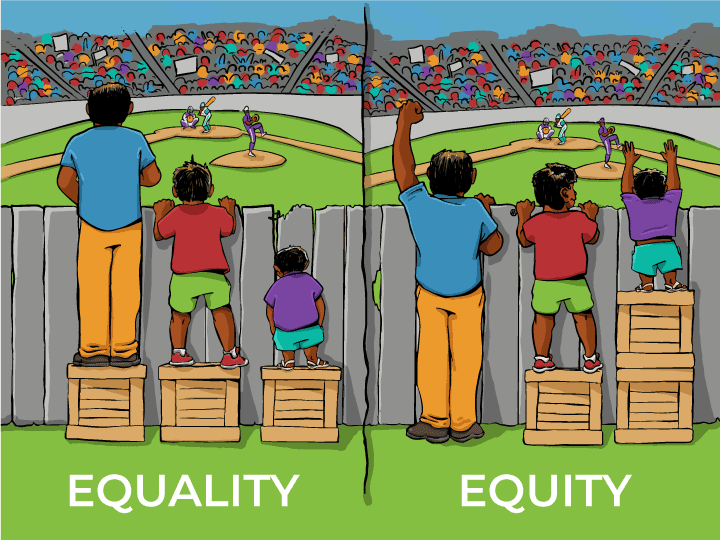Social Justice
What exactly is social justice?
There are many definitions of 'social justice'. But at the end of the day, it probably comes down to equal rights, equal opportunities, and equal treatment. As human beings, we all want similar things, and we all deserve equal shares of dignity and respect.
But effecting greater social justice doesn't just mean making everything "equal." It means promoting equity among all members of our families, our teams, our organizations, our communities, and our world.
Any hope for Social Justice must include the will to understand how organizing structures, such as cultural and economic practices, policing, technologies, and various other instritutions, either impede or promote greater justice for all. In striving to improve those social, cultural, juridical, technological, and certainly economic institutions, we hope to promote a greater sense of communal equity, a "common good" which leads to personal enrichment for individual community members.
Let's look at some definitions of equity/equality and social justice, below:
Equity vs. Equality
Equity involves trying to understand and give people what they need to enjoy full, healthy lives. Equality, in contrast, aims to ensure that everyone gets the same things in order to enjoy full, healthy lives. Like equity, equality aims to promote fairness and justice, but it can only work if everyone starts from the same place and needs the same things.
Social Justice
Social justice is the relation of balance between individuals and society measured by comparing distribution of wealth differences, from personal liberties to fair privilege opportunities. In Western as well as in older Asian cultures, the concept of social justice has often referred to the process of ensuring that individuals fulfill their societal roles and receive what was their due from society. In the current global grassroots movements for social justice, the emphasis has been on the breaking of barriers for social mobility, the creation of safety nets and economic justice. Social justice assigns rights and duties in the institutions of society, which enables people to receive the basic benefits and burdens of cooperation. The relevant institutions often include taxation, social insurance, public health, public school, public services, labor law and regulation of markets, to ensure fair distribution of wealth, and equal opportunity.
Social Justice
Social justice is an underlying principle for peaceful and prosperous coexistence within and among nations. We uphold the principles of social justice when we promote gender equality or the rights of indigenous peoples and migrants. We advance social justice when we remove barriers that people face because of gender, age, race, ethnicity, religion, culture or disability.
Social and Economic Justice
Social justice encompasses economic justice. Social justice is the virtue which guides us in creating those organized human interactions we call institutions. In turn, social institutions, when justly organized, provide us with access to what is good for the person, both individually and in our associations with others. Social justice also imposes on each of us a personal responsibility to collaborate with others, at whatever level of the “Common Good” in which we participate, to design and continually perfect our institutions as tools for personal and social development.
Economic justice, which touches the individual person as well as the social order, encompasses the moral principles which guide us in designing our economic institutions. These institutions determine how each person earns a living, enters into contracts, exchanges goods and services with others and otherwise produces an independent material foundation for his or her economic sustenance. The ultimate purpose of economic justice is to free each person to engage creatively in the unlimited work beyond economics, that of the mind and the spirit.
